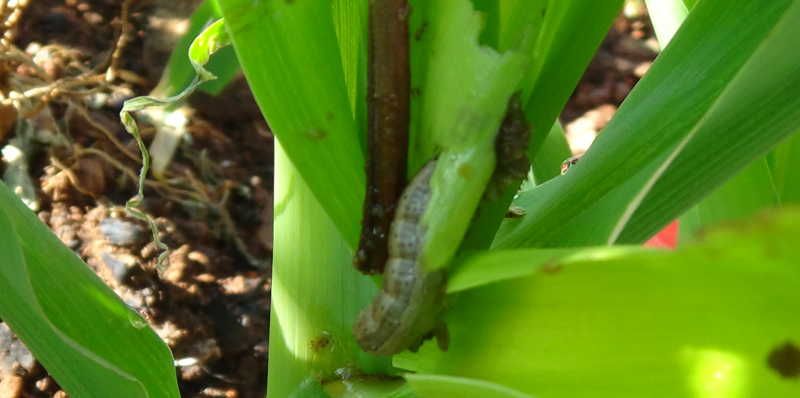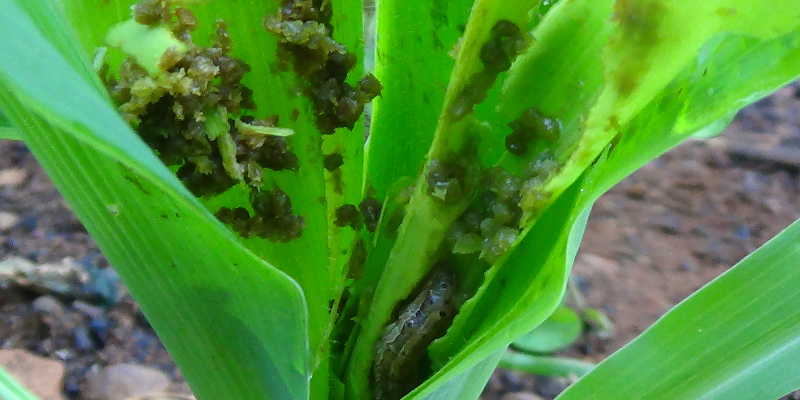

The monster hides deep in the head of the maize crop that it’s hardly visible during day. It ressufaces at night to devour the host
he farming community in Uganda, which comprises more than 80 percent of the population is gripped with desperation and anxiety resulting from the ongoing spread of the fall army-worm to nearly all the farming regions, amid a sharp rise in food prices.
The sense of fear is complicated further by the stock-out of affordable and effective pesticides from the leading chemical dealer – Bukoola Chemical Industries Ltd.
As predicted by The Sunrise two weeks ago, Bukoola industries has run out of the most effective pesticides known as Dudu Fenos and Striker, which farmers have been using to control the invasive armyworm. Striker and Dudu Fenos, also known as Rocket, are on the list of the government’s recommended pesticides.
Bukoola’s Chief Executive Officer Paul Kyabaggu told The Sunrise that the stock-out is as a result of excessive demand outstripping available limited supplies.
“It [stock-out] took us by surprise. Unfortunately, we cannot obtain new consignments until after two months. This will be too late for planting. It means that we can realistically expect new supplies next planting season,” said Kyabaggu.
He noted that the company is however testing a new organic compound known as Nimbecidine to control the pest.
“We are testing a new pesticide called Nimbecidine. However, the effective doses in controlling the armyworm are much higher at 100mls in 20ltrs of water compared to Fenos (30mls per 20ltrs of water),” added Kyabaggu. A litre of Nimbecidine costs around Ushs30,000, meaning that farmers need to spend about Ushs100,000 to spray an acre of maize using Nimbecidine.
Fortunately perhaps, as Kyabaggu noted, Rocket, another strong pesticide which is also recommended by the government, is effective in controlling the army worm. “Rocket has the same chemical compounds as Dudu Fenos,” Kyabaggu remarked.
One agrochemical input dealer identified as Susan Najjemba in Kyerima, Ggomba district however warned about the dangers that are associated with Rocket. “You have to be careful with Rocket, if you don’t apply it carelessly, you may burn the crops,” warned Najjemba.
News of the stock-outs comes a day after the minister of agriculture Vincent Ssempijja revealed a government plan of distributing free pesticides nationwide as a way to support people’s efforts in controlling the pest.
Whereas minister Ssempijja promised that the government would buy pesticides for distribution to farmers, the promise may remain hollow because of the stock-outs of pesticides being experienced. In fact, latest reports indicate that the government is now more keen on teaching farmers HOW to spray the caterpillars as opposed to giving them the pesticides.
“The Ministry of Agriculture and NARO have so far confirmed damages on maize sorghum, rice, Kikuyu grass, Napia grass and Sugarcane crops. As an emergency intervention, MAAIF is advising farmers to use a pesticide combination of Lambda-cyhalothrin (106g/l) and Thiamethoxam (141g/l) (STRIKER 247 SC or ENGEO K 247 SC) and Rocket at a rate of 20-30mls in 15 – 20 litres of water as we explore more sustainable management measures.
Meanwhile, scientists have urged the government to urgently pass the Biotechnology and Biosafety Bill to enable the release of a maize variety that has proven to be resistant to the pest.
Using losses experienced in other countries such as Zambia, the ministry warned that Uganda may suffer losses of up to 450,000 metric tonnes, worth about US$200m.
“The figures that we have are only reflective of maize, however the pest affects more crops mentioned earlier thereby heightening the potential loss to the economy. Our Government has set aside UGX 4.5 billion which is now being used to control this pest,” said Ssempijja.
The Kenyan government had initially set aside some US$1million to control the fall armyworm, but latest news of farmers getting alarmed by the outbreak may force the government to up its budget towards addressing the problem.
Meanwhile, last years prolonged drought continues to cause a spike in food prices as stocks run out. A mini survey by The Sunrise reveals that a kilo of maize flour has reached a record Ushs3000 in Kampala and is nearing Ushs4000 in other parts of the country. A kilo of beans is also trading between Ushs3,200 and Ushs3,500. A kilo of millet as well as cassava flour has crossed the Ushs2500 mark, a historic record.
A kilo of rice has jumped from Ushs3,000 to Ushs4,500 in a space of three months.
The situation is complicated by limited supplies of fresh foods such as Matooke, Potatoes, Sweet Potatoes and Cassava. A 100kg bag of Potatoes is currently trading above the Ushs250,000 in Kampala.
In many rural areas, people survive on a single meal of Posho (a paste made from maize flour) and fresh vegetables a day.
To make matters worse, a good number of rural dwellers depend on food purchased by their relatives in Kampala. As one Kenneth Lukwago, a journalist with Radio one, revealed to this writer recently, he has now become the garden for some of his relatives upcountry as he has to send food on a weekly basis.
Harriet Abunwaku, who lives in Nagguru Kampala but has relatives in Iganga Busoga sub-region, intimated to The Sunrise how she and her sisters in Kampala have decided to forsake meat for the more essential maize floor as Eastern gifts this festive season.
The latest measure by the government to immediately lift import taxes on rice, a few months before the reading of the national budget captures the urgency of the food insecurity in the country.














Henry Lutaaya
Leave a Comment
Your email address will not be published.